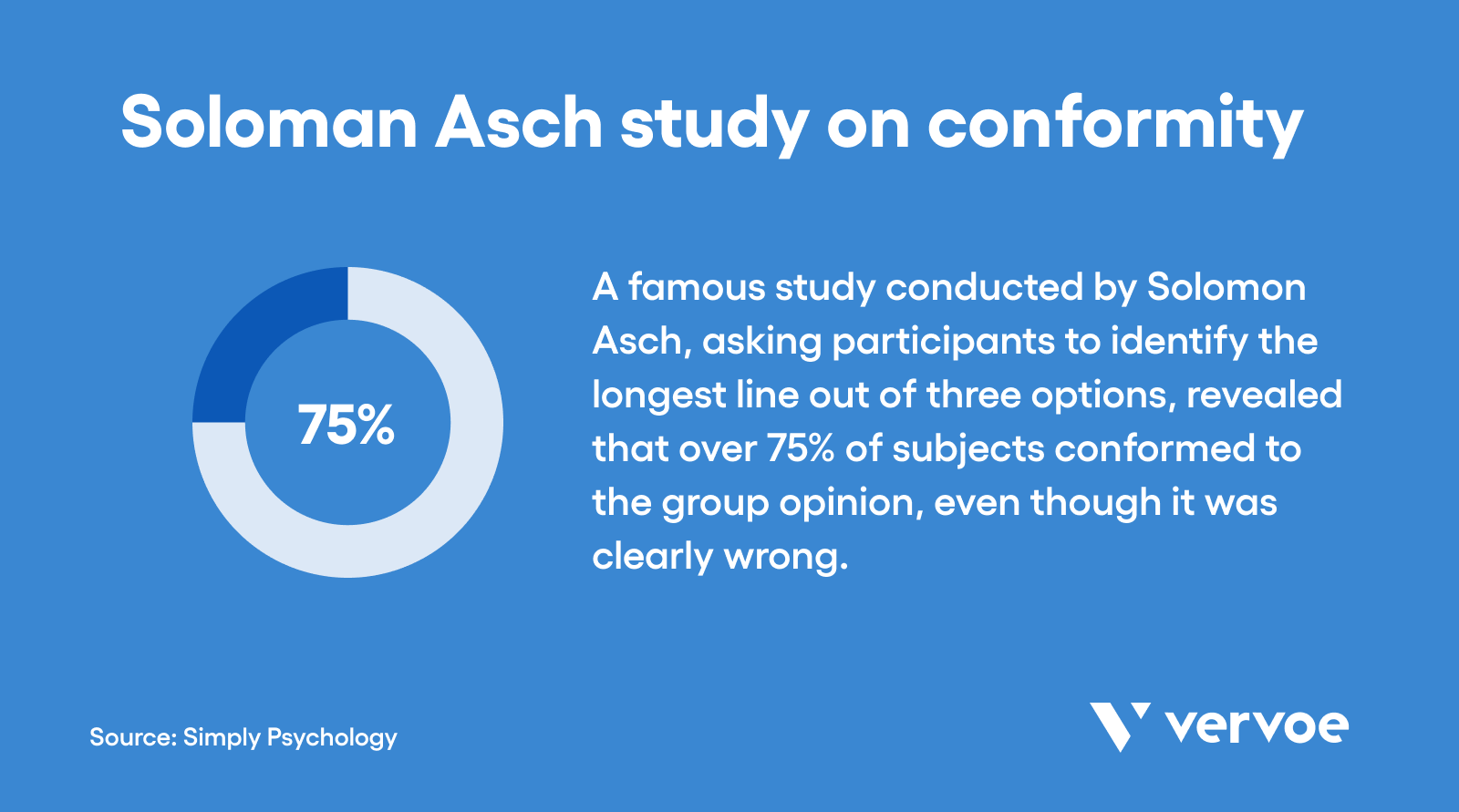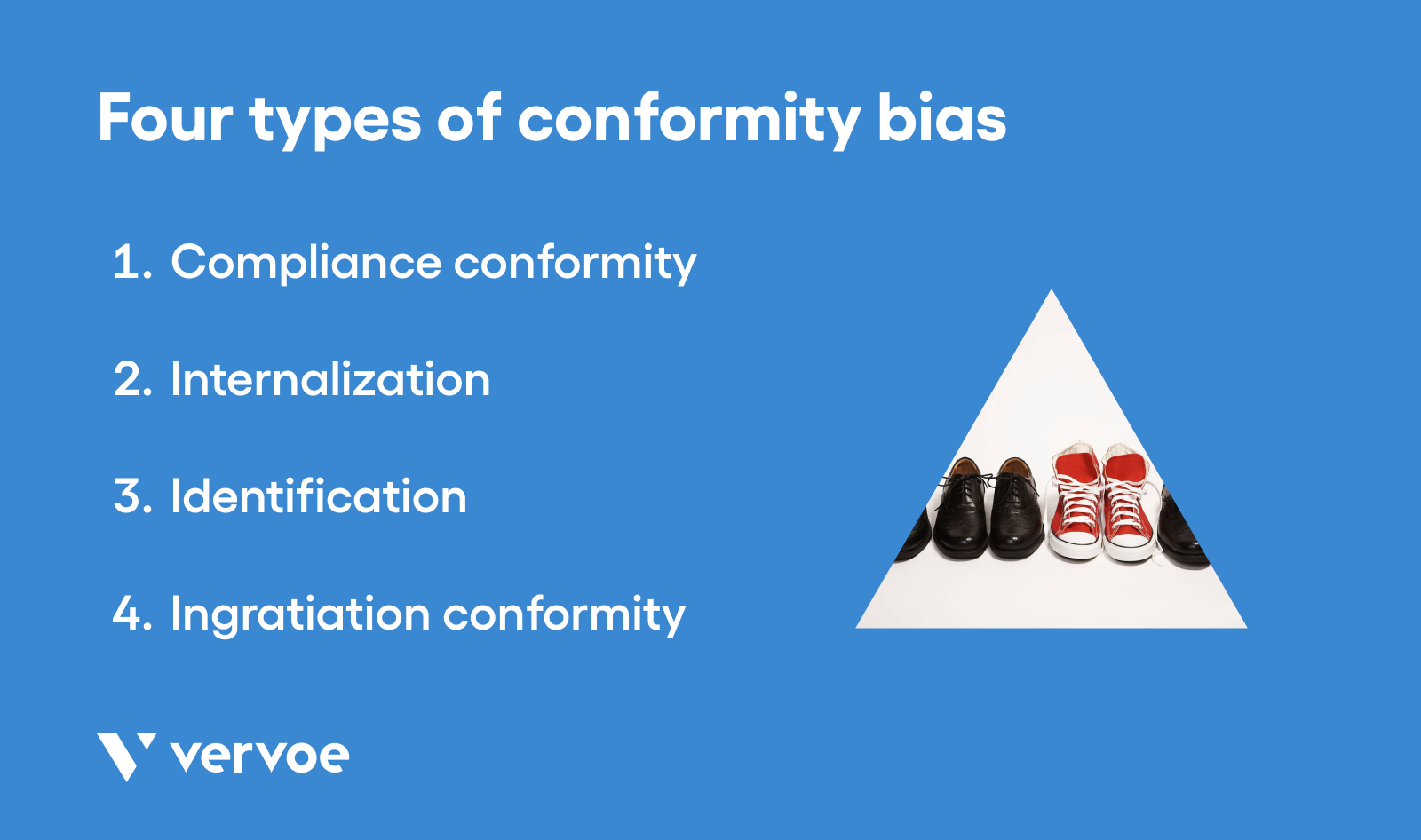When it comes to creating a workplace atmosphere, you want to make sure the people you hire feel comfortable sharing their points of view.
As a manager, you possess a unique amount of power that may make the people working for you nervous to call things out when they think there’s a better way to tackle things.
Conformity bias is what can happen when there’s a lack of diversity of opinion on a team, and workers feel uncomfortable being the outlier voice. It can also develop out of a lack of diversity of perspectives in a department, and poor people management.
Whether it’s a result of the hiring manager consistently employing people that are virtual clones of themself, or just setting a poor culture that doesn’t encourage collaboration and debate, conformity bias can creep into organizations when you least suspect it.
So, how do you spot it, and tackle it before it affects your business’ productivity?
Read this article and find out.
What is conformity bias?
Conformity bias happens when we change our perception and thoughts to match those of the majority because we feel pressured and want to fit in.
Part of a range of unconscious biases in the workplace, this one is incredibly common with psychologists having studied it for decades, finding, startlingly, that most people conform to group pressure.
A famous study conducted by Solomon Asch, asking participants to identify the longest line out of three options revealed that over 75% of subjects conformed to the group opinion, even though it was clearly wrong.
These findings mirror what can happen in the workplace, where a large number of us are vulnerable to groupthink.

What does conformity bias in the workplace look like?
Offices are rife with conformity bias. But it can often be hard to tease out and see explicitly.
Let’s say you’re in the midst of the hiring process and you’ve just conducted a candidate interview with a panel of colleagues.
The interview wraps. You believe the candidate did well and will be a good match for your team. But before you can share your thoughts, your manager says they didn’t like the candidate; an opinion quickly echoed by a succession of other panel members.
All of the sudden, your opinion is the outlier, and if you share it you feel you’ll be rocking the boat.
Situations like these happen on a daily basis in the workplace, we’re just not always fully cognizant of them.
What are the characteristics of conformity?
There are two different characteristics of conformity: normative influence and informational influence.
Normative influence happens when a member of the team wants to be liked by that group so they don’t want to, in any way, deviate from it by sharing their own independent judgment. Therefore, they accept the group consensus and publicly agree with it, even though they privately deviate from that view.
Informational influence happens when the team presents the information and the member isn’t really certain about their opinion and is on the fence. The member then looks to the group for guidance, believing the consensus they’ve formed must be more informed than their own.
What issues does conformity bias create for an organization?
Conformity bias (aka groupthink) can cause quite a lot of problems for an organization.
First of all, you want to have different opinions and perspectives in your organization because that’s how you’ll find solutions to problems that suit a diversity of end-users. When faced with a challenge, having different perspectives can produce the most effective solutions.
On top of that, you want your employees to be able to innovate for your business. And for them to innovate, they need to be allowed to make mistakes and not be punished for them.
An employee who is fearful of what others might think of them won’t be confident to voice their opinions about bad hiring decisions and in the end, the judgment will affect the business’ bottom line. So, having your employees know that their company is a safe space where they can freely express their opinion is imperative if you want to deal with conformity bias.
What are the four types of conformity bias?
There are four types of conformity bias…
1. Compliance conformity
Compliance conformity is often called group acceptance. This happens when a team member conforms to peer pressure even though they personally don’t have that tendency. The member does it to receive group approval and the belief for the member stops as soon as there’s no pressure to conform.
2. Internalization
Internalization is the genuine acceptance of a company’s group norms, where an individual accepts the ideas and thoughts of the group as their own. It involves both public and private conformity and the member’s own value system aligning with the group’s ideas.
3. Identification
Identification is all about group membership. This happens when an individual accepts the influence of the group because they want to create a social connection with the group and its members.
4. Ingratiation conformity
This happens when a person wants to conform to the group’s ideas because they want to impress them or gain favor from them. Contrary to normative influence, the individual here isn’t motivated by the fear of rejection, but by the need to receive some social reward from the group.
Conformational behavior: Unconscious bias in hiring
When it comes to hiring, there are many risks of bias. Since there are many hiring managers involved in the process, there are countless opportunities for conformity bias to seep in.
The one example we’ve already mentioned is where the member of an interview panel was afraid to voice a differing opinion. But that’s not the only scenario conformity bias can pop up.
When it comes to hiring diverse employees — be it women, people of color, LGBTQIA+ people, and neurodiverse people, among others — you may unconsciously give the most attention to the talent you think the group will approve, creating an unfair hiring environment that can lead to poor hiring decisions.
Avoid conformity bias by using skills assessments
We’ve talked a lot about how conformity bias can create problems in the hiring process, but let’s see how we can use skills assessments to solve these challenges.
During the hiring process, you want to have a clear objective to give the job to the best possible candidate. To achieve this, it’s imperative you see how each candidate performs on the job.
Vervoe skills assessments simulate realistic on-the-job scenarios that give applicants a clear idea of what the job will actually be like, and hirers a clear picture of the skills each candidate has.
With a comprehensive range of different question types, and AI grading, powered by machine learning, Vervoe helps identify the strongest candidates to fill your open roles and reduces the time it takes, and the bias involved in spotting great performers.
Avoid making decisions by conforming with the pack, let candidate performance do the talking, and give yourself the confidence to go to bat for the one candidate you know can actually do the job with Vervoe skills assessments. And reduce the threat of conformity bias entering your hiring process.
Conclusion
While conformity bias is insidious, it’s certainly not the only type of bias roaming the halls at most organizations.
Learn more about the different types of hiring bias lurking in most companies, and how to avoid them in our article on How To Avoid The 12 Kinds Of Hiring Bias In Your Recruitment Process.





















